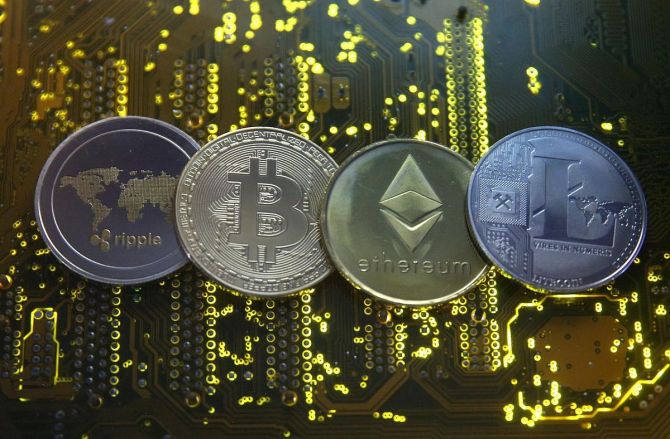Investors, including large corporations, view them as a potential hedge against uncertainty, and mainstream investment banks too are jumping into the game.

In the last year, cryptocurrencies have become mainstream assets.
And it isn’t only the fact that they have delivered stunning returns as a class, beating stocks, debt instruments and precious metals.
S&P Global intends to launch a cryptocurrency index in 2021, tracking over 550 different cryptocurrencies, which means that hedge fund exposures to this asset-class will surge.
A major investment bank (Citi) suggests that bitcoin (currently trading at around $26,600) could hit the insane heights of $300,000.
Half a dozen global investment majors are now offering managed crypto investment services, which means that they will be persuading high net worth clients to create crypto-based portfolios.
A small but growing proportion of cross-border trade is also being done in cryptos by corporations, willing to accept the exchange risk in lieu of significant savings in forex transaction costs.
More governments, including China, are looking at creating their own digital currencies, as are consortiums of big corporations (including one anchored by Facebook), which are looking at creating “stable coins”, anchored by the value of an underlying currency basket.
Does all this signal a likely bubble? Yes, because demand for cryptos is likely to keep growing.
While the risks are obvious, investing into the early stages of any bubble can be a profitable decision.
It’s clear that a certain class of investors now view cryptos as a potential hedge against uncertainty and it’s also clear that if mainstream investment banks are jumping into the game, there will be serious demand expansion.
It’s worth noting that, unlike with fiat currencies, the value of bitcoin, ripple and ethereum, etc, are not anchored to any fundamentals at all.
You can conceivably assess the “fair value” of the rupee, or the USD, by examining trade numbers, comparing inflation rates, looking at Current Account and Capital Account data, factoring in GDP growth estimates, etc.
But the value of bitcoin or other cryptocurrencies (not stable coins) is determined purely by the demand for it, versus the supply of the crypto.
Also, unlike fiat currencies, the money supply trends of cryptocurrencies cannot be altered; the money supply trend is known with mathematical certainty for decades.
(“Stable coins” would be a different ballgame. The supply here would be tied to the value of the underlying basket of fiat currencies, somewhat like the currency board model used by certain countries.)
In terms of utility, bitcoins are used in normal commercial transactions somewhat more often than gold, but much less than normal fiat.
For example, online gaming portals often make pay-outs in bitcoins and some gaming portals have developed their own cryptos for internal use as well.
The global poker fraternity has embraced cryptos with enthusiasm.
This is partly due to the need for professional poker players to evade taxes and sidestep regulations.
Online gambling is illegal in many nations, including in the USA.
But cryptos really do offer a big legitimate advantage in cross-currency transactions, and the global remittances market is waking up to this factor.
If you convert dirhams directly to rupees, and remit to Kochi from the Gulf, you pay bank charges, which add up.
Buying crypto in dirhams and selling in rupees leads to substantial savings since the exchange brokerage fees are tiny.
This is if you can handle the inherent price volatility of cryptos, of course.
China has attempted to ban crypto trading because it sees this utility factor of cheap, easy, cross-currency transactions as enabling flight of capital.
During the Cyprus financial crisis of 2012, bitcoin was used to bypass currency conversion restrictions set by the EU, with Euros in Cyprus being converted to bitcoin, and bitcoin to dollars.
Some governments such as the US, Australia and Japan are now putting, or have already put, draft guidelines in place for corporations to use crypto in transactions.
The US Fincen, for instance, could be a template for other nations.
The Indian regulatory situation as pertaining to crypto currency is a black hole, right now.
The Reserve Bank of India attempted to ban any banking transactions related to crypto-trading in an April 2018 notification.
This was struck down by the Supreme Court in March 2020.
Since then, crypto trading has surged with most platforms reporting 2x or higher gains in rupee trading volumes between March and December.
Several Indian banks now also facilitate crypto trading, by extending services to trading platforms.
But there have also been sporadic threats by senior ruling party politicians to bring in legislation to ban crypto-trading and usage, despite its obvious popularity.
There’s also anecdotal evidence that cryptos are being increasingly used to transmit remittances — India is a big remittance market with over $80 billion of transfers in calendar 2019.
Incidentally, despite the high face value of bitcoin and other cryptos, it is easy to trade in very small units.
You can trade a millionth part of a bitcoin (a “Satoshi”, named after the creator). Trades on exchanges with high Indian presence tend to start at a minimum value of about Rs 150.
If you’re an Indian trading cryptos, you need to cope with the anxiety of unpredictable change in regulatory regime.
There is also a lack of clarity about taxation, and the calculation of profits long-term capital gains versus short-term or normal income from speculative activity.
There’s also lack of clarity about the offset of trading losses.
Globally too, there could be unpredictable regulatory hurdles that impact these assets.
Balanced against that, Wall Street’s apparent acceptance of these digital constructs as a mainstream asset-class guarantees more investor interest — and that could translate into yet another big bull run.
Photograph: Dado Ruvic/Reuters











